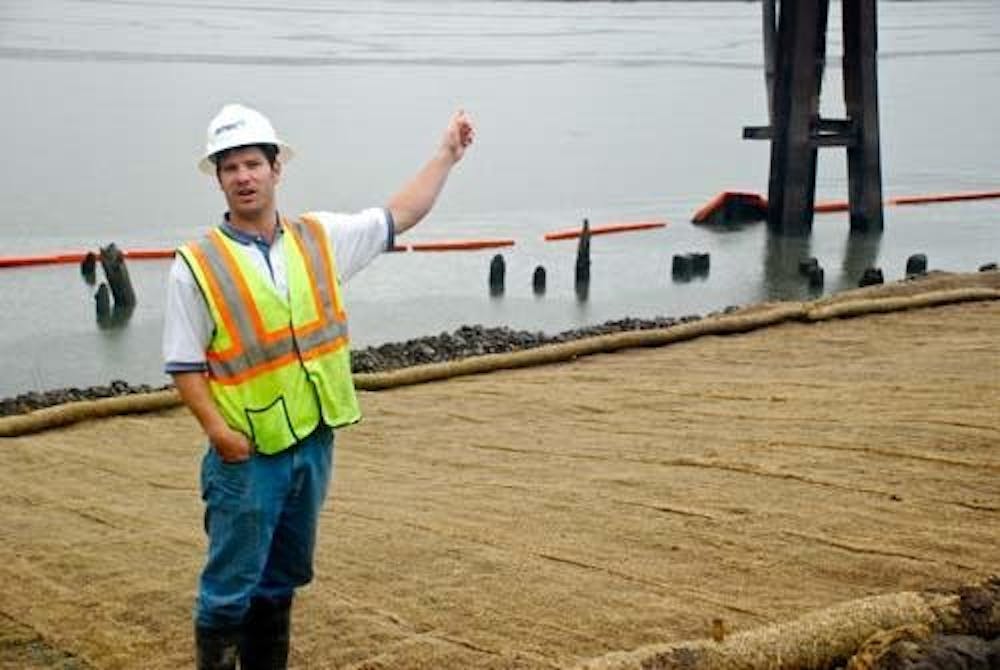After months of work, the River Campus property will be safe by EPA standards at the end of November
On-Site Field Engineer Dan Schall (left) motions towards the River Campus where efforts have been focused on cleaning up the toxic soil. (Jackie Jeffers | The Beacon)
By Harry Blakeman, Staff Writer blakeman15@up.edu
Since Dec. 2008, when the University of Portland purchased the 35 acres of what is now known as the River Campus, it has been caught up in a lengthy process to reclaim the site from toxins that were embedded into the soil after more than a hundred years of industry.
By the end of November, that process will be complete and the once poisoned property will be restored to an environmental level sanctioned by the Environmental Protection Agency (EPA) and suitable for development.
Dan Schall, the on-site field engineer who acts as a liaison between the University and AMEC, the engineering firm responsible for the project, said that over the years the previous owners of the land had treated the property poorly. In the past, the land had housed a power plant, a lumber mill, a concrete company and a barge company. Schall said that before the EPA, many industrial sites like this took little of environmental ethics.
"The solution to pollution was dilution," said Schall.
Schall explained that before the EPA, the industrial companies that operated from the site did not have regulations for disposing waste. One option the companies took advantage of was to pile and compact the debris and refuse generated from industry into the shoreline, in an effort to create a near vertical shore that could be used to harbor ships.
"We're pulling out pipes, cables, everything - it's a mixed bag of blocks, debris and tires - a hundred years of industrial activity," said Schall.
Because this system is toxic and unnatural for the environment, the University has restored the shoreline to a gradual 5:1 ratio that slopes into the river and creates a shallow water area that will support salmon and other freshwater shallow-dwelling animal life. The University will plant a variety of over 15,000 plants to both act as a barrier for the River Campus from the shore and to landscape the area. UP has consulted with the Grand Ronde tribes and the City of Portland to find plantlife that is suitable to the area and that thrives during floods.
Jim Kuffner, assistant vice president of community relations, oversees the project and thinks that even with all the industry, UP has been fortunate that it can recycle much of the material on the River Campus for other uses.
"Most of the capping material was on-site," said Kuffner, referencing the material used to finish the new shoreline.
Additionally, much of the debris removed from the shore can be used to create foundations of future buildings or the future baseball stadium, the first project being developed.
The long-term goals of the River Campus are to house facilities that would be better suited outside the academic and residential campus on The Bluff. This would include the baseball stadium and eventually parking, practice fields, the tennis center and Physical Plant. The land could also lend itself to a boathouse and an environmental science center.
Overall, the River Campus would support students on The Bluff. This will be necessary as per UP's Master Plan. The student body could grow from approximately 3,200 undergraduates to nearly 5,000. The Master Plan, UP's official growth plan, was recently approved unanimously by the University Park Neighborhood Association. This makes approval by the City likely, and will make much of the River Campus possible. The hearing is set for Nov. 14.
All of these projects at the River Campus are contingent on financial gifts to the University, but having the land and preparing it for development is the essential first step to the process.
Sophomore Sean Galvin is excited about the changes that the River Campus offers the University, particularly the opportunity to go down and see all the progress that's been made.
"I don't think its gonna affect us as students right now, but if the school becomes this big attractive college, alumni might be more willing to feed money back into it," said Galvin.
Kuffner remains optimistic that UP will grow and thrive once the River Campus is developed.
"When your children and grandchildren come to UP, the River Campus is gonna be awesome - we've been on The Bluff for so many years, down here we get our feet wet," Kuffner said.
Workers use an excavator to sort soil. The large pieces of rock and metal pipes are rejected, and the finer soil will be used. (Jackie Jeffers | The Beacon)
Schall said the pollution had to be cleaned up by diluting the soil. (Jackie Jeffers | The Beacon)
The shoreline along the soil was overrun by plants and debris before it was cleaned up. (Jackie Jeffers | The Beacon)
(Jackie Jeffers | The Beacon)
(Jackie Jeffers | The Beacon)
(Jackie Jeffers | The Beacon)
(Jackie Jeffers | The Beacon)
(Jackie Jeffers | The Beacon)








